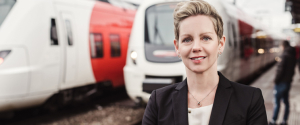-
Home
-
About Persontrafik
-
Plan your visit
-
For exhibitors
- Confirmed exhibitors 2024
-
As the CEO of one of Sweden’s largest regional public transport companies, Sofia Malander knows what it takes: customer focus, continuous development, and courageous staff. She wants to spread that courage to the rest of the industry.
 Earlier this year, Östgötatrafiken and Sofia Malander made headlines with a new differentiated pricing system. The off-peak ticket makes it cheaper for customers who want to travel outside rush hours.
Earlier this year, Östgötatrafiken and Sofia Malander made headlines with a new differentiated pricing system. The off-peak ticket makes it cheaper for customers who want to travel outside rush hours.
“Price differentiation is something we have discussed in publicly funded public transport for many years. We have seen the potential but haven’t taken action.”
Sofia Malander acknowledges that congestion during peak hours is a problem but believes it is very difficult, for example, to get schools and workplaces to change their schedules. However, the problem can be partially solved with cheaper tickets during low-traffic periods.
“Prices are something we have complete control over. We conducted extensive market research beforehand and are now evaluating how it’s going. It’s just about seeing what we can do and then daring to try something new!”
In this endeavor, Sofia Malander has great help from the people working within Östgötatrafiken. She speaks warmly about the curious and interested employees but also emphasizes that leadership needs to provide the conditions for all employees to demonstrate that courage.
Östgötatrafiken offers customers a wide range of transportation options: city, intercity, and regional buses, commuter trains, archipelago boats, trams, paratransit, and school transportation. The company has a turnover of 1.8 billion SEK, and in 2019, over 31 million trips were made. Sofia Malander joined the company six years ago after being the chief legal officer of Region Östergötland.
“My driving force has always been organizational development. When I was offered the job as chief of staff, I accepted because I saw that the entire public transportation sector was undergoing a transformation from a production perspective to customer focus. It felt like an exciting journey to embark on.”
A little way into that journey, an enormous obstacle emerged in the form of the COVID-19 pandemic. Sofia Malander doesn’t shy away from admitting that it has been a tough time, not only for Östgötatrafiken but for the entire industry.
“The pandemic was an incredibly hard blow. Almost like a trauma. Within a couple of weeks, we lost half of our revenue. The region provided additional funds, but there was a period in early 2020 when we couldn’t even pay the employees’ salaries and had to rely on a line of credit to manage our liquidity.”
Sofia Malander reminds us that the industry has worked its way up in reputation from a sort of “second-class mode of transportation” to a modern and sustainable way to travel for everyone. That reputation was at risk of being erased when authorities said, “Don’t choose public transport, you’ll get sick.”
“It became emotionally taxing to think, ‘Are we going to have to start over when the pandemic is over?'”
It didn’t turn out quite that bad, and Östgötatrafiken had already returned to the 2019 level before summer. Sofia Malander would have preferred to be at the 2022 level, but she is glad that the recovery has been relatively quick. She sees a bright future for the country’s public transportation, especially as sustainable travel is increasingly demanded by more people.
Four challenges for public transportation according to Sofia Malander:
Increased revenue needs – We need to tap into the willingness to pay for private cars but also be willing to charge for our product when it is competitive.
Innovation and fresh thinking – Some significant steps need to be taken in public transportation, but it is equally important that we continuously improve what we already do.